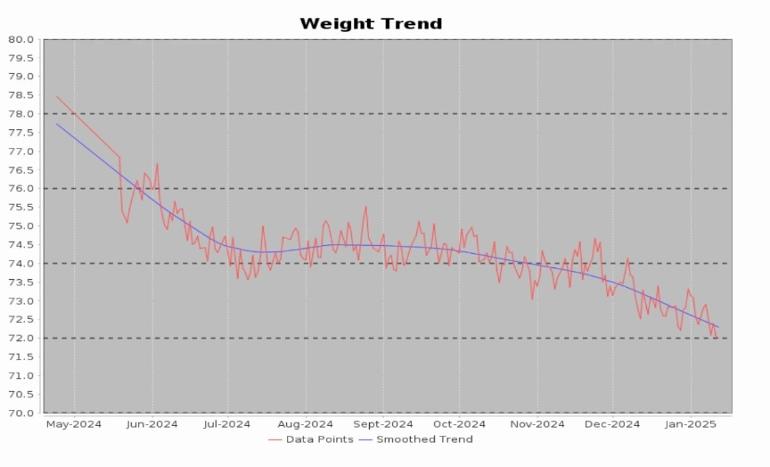A lot of us here are on ADT and that can trigger fat gain. I thought I'd share how I manage it fairly successfully. I'm sure a lot of others do the same and maybe we can swap tips.
Although this works for me (I love measuring things) it may not work for you and it does rely on a fairly stable diet that can be adjusted slightly when needed. I never count calories and I don't forbid myself foods I like.
The technique uses daily weighing on a connected scale that can automatically plot values to show mid and long term trends. To make this work you need to accept daily fluctuations and not worry about them (easier said than done). Go slow! See below why.
This graph looks dramatic but check the axes. It is really between around 78 and 72.5 so 5.5 kg over 8 months, but with zero hardship and no hunger.
When I talk about weight I really mean body fat. Weight is mostly irrelevant, fat counts. Weight is sort of a biomarker for fat 😉. Weight change can be a poor proxy for fat change in some cases, for example with water retention.
My weight change each day can be up to 1 kg (2 pounds). It is almost impossible to gain (or lose) this amount of fat (you can easily calculate how many excess calories you need to consume - it is a lot). This additional weight is typically water in glycogen, but also undigested food. Some foods also increase water retention, wine does for me for example. Saturday/Sunday dinner used to include wine and my weight would always be up on Sunday morning but back to normal on Tuesday.
So, if my weight jumps up, I just think OK, very slight food intake adjustment that day, maybe skip a snack (hard, I know) or just do some extra exercise.
This is where the daily feedback helps with motivation and if you are looking forward to tomorrows measurement then this may work for you. Don't be surprised if instead it goes the other way for a day or even two!
Conversely, if the measurement drops a lot, I increase food a little that day to avoid rapid loss (see below). On a special occasion I just eat normally, try not to be obsessive.
My goal is very slight increases or decreases in weight over time.
Increases should actually be slower (while exercising) to avoid taking on too much fat without the time to build muscle.
Decreases must not be too rapid, otherwise you lose a higher proportion of muscle (both muscle and fat are lost with a calorie deficit).
The very worst thing you can do is bounce dieting. Losing weight quickly (fat + muscle) and then gaining the weight again (mostly fat). This is typical of fad or unsustainable diets.
Personally, I think the expensive body composition scales are not so useful, just ask to include body composition in your DEXA scan when measuring bone mineral density and then use your scale.
Tips:
• Invest in a scale with connectivity (it is not feasible to log this manually)
• put the scale where you won't forget it and can step on it when half asleep
• measure first thing in the morning (before eating/drinking)
• pee first (really important if you want body composition scales to be useful - I never use them)
• wear similar clothes - I just wear a sleeping tee shirt
The image above shows my weight while on treatment. I hadn't been managing my weight for a while, just doing regular lifting sessions at the Gym (carrying a few extra kilos allows you to handle more weight).
After diagnosis and when I had time to even think about it, I decided to get to a good weight and stay there. I started just after starting Orgovyx and just before RT.
In the beginning, losing 4 kg in 2 months was too fast. Part of this was the bad diet I was on for RT when I wasn't eating enough. I usually aim for 1kg per month or less.
After that I levelled off just under 75 and then decided I could lose a bit more and have levelled off between 72 and 73. I plan to stay here for 3 months and see after that. Perhaps I will drop another kilo or two. I have a DEXA scan coming up and will decide after that.
Hope it helps someone,
❤️ Mark
